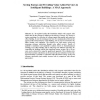Free Online Productivity Tools
i2Speak
i2Symbol
i2OCR
iTex2Img
iWeb2Print
iWeb2Shot
i2Type
iPdf2Split
iPdf2Merge
i2Bopomofo
i2Arabic
i2Style
i2Image
i2PDF
iLatex2Rtf
Sci2ools
127
click to vote
MA
2000
Springer
2000
Springer
Saving Energy and Providing Value Added Services in Intelligent Buildings: A MAS Approach
In a de-regulated market the distribution utilities will compete with added value for the customer in addition to the delivery of energy. We describe a system consisting of a collection of software agents that monitor and control an office building. It uses the existing power lines for communication between the agents and the electrical devices of the building, such as sensors and actuators for lights, heating, and ventilation. The objectives are both energy saving and increasing customer satisfaction through value added services. Results of qualitative simulations and quantitative analysis based on thermodynamical modeling of an office building and its staff using four different approaches for controlling the building indicate that significant energy savings, up to 40 per cent, can be achieved by using the agent-based approach. The evaluation also shows that customer satisfaction can be increased in most situations. In fact, this approach makes it possible to control the trade-off bet...
| Added | 25 Aug 2010 |
| Updated | 25 Aug 2010 |
| Type | Conference |
| Year | 2000 |
| Where | MA |
| Authors | Paul Davidsson, Magnus Boman |
Comments (0)

